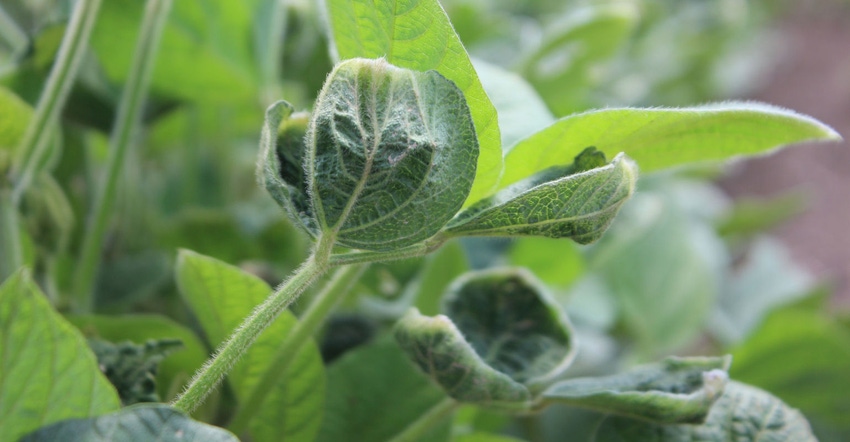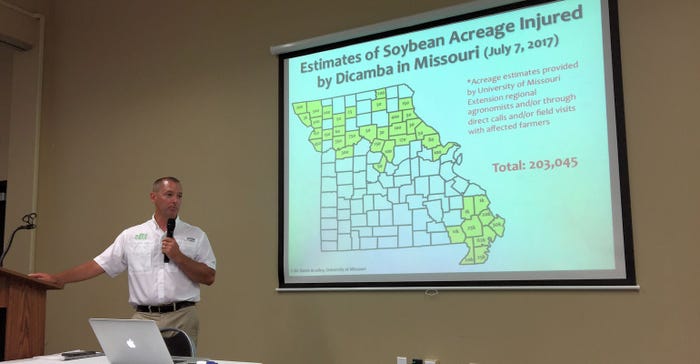
It seems like déjà vu for Sam Atwell. Last year he fielded calls of dicamba drift injury starting in June and this year was no different. The University of Missouri Extension agronomist estimates that 62,000 acres in New Madrid County now show signs of dicamba injury.
In 2016, the blame for injury was on old herbicide technology sprayed off-label over dicamba resistant cotton and soybean technology. In 2017, despite new chemistry in the marketplace allowing for legal spraying and promising less volatility, Missouri is seeing more dicamba-related complaints. "It seems to the soybeans are sensitive to this chemistry too," Atwell said.
Still a product problem
Atwell said that some farmers might still be spraying old chemistry over the top of Bollgard II XtendFlex or Roundup Ready 2 Xtend Soybeans creating injury issues, but found more using the new technology like FeXapan, Engenia and Xtendimax this year. Still, there is a problem.
"The majority of fields I've been in are injured from one end to the other with no discernable difference in soybean symptomology," according to University of Missouri Extension weed specialist Kevin Bradley. "This suggests problems with off-site movement through volatility."
Bradley, along with a graduate research assistant, conducted a trial applying the three EPA approved technologies to soybean plants in a greenhouse setting. The plants showed signs of volatilization still occurring 24 hours after treatment. "What that says to me, is that we have an issue to deal with with volatility," he said.
Company response
In a written statement to Missouri Ruralist, Monsanto responded to the concerns over drift associated with its product--Xtendimax. "We spent years developing the Xtendimax with VaporGrip Technology to minimize the potential for off-site movement. Dicamba products approved for in-crop use are valuable tools for growers to manage problematic weed."
The company remains committed to the technology. The state of Missouri currently does not.
Just last week, Missouri Director of Agriculture Chris Chinn issued a temporary Stop Sale, Use or Removal Order for all agricultural uses of dicamba products--including Monsanto's Xtendimax. The product may not be used by growers or sold by retailers.
"Monsanto is complying with the order and encourages all growers, retailer and distributors to do the same," the statement read. The company noted it is working with the state ag department to develop possible special local need labeling restrictions for the remainder of the growing season.
The company reiterated its commitment to helping farmers use the Roundup Ready Xtend Crop System successfully.
Call to action
Chinn called on companies, researchers and farmers to work with the state ag department to determine when and how to resume applications of approved dicamba products.
For Bradley, it comes down to sharing information. Companies needed to share the amount of product sold or sprayed and the acres planted to dicamba-resistant varieties. But farmers need to do their part.

RAISING ALARM: MU weed scientist Kevin Bradley says the growing number of dicamba-related complaints creates concerns regarding new chemistry introduced into the marketplace.
Farmers across Missouri stopped talking to each other and extension agents. Bradley witnessed farmers removing flags that alert others to the type of technology planted in a field. "They are taking them out of the field and back to the barn," he said. "They don't want to be blamed." However, researchers need information from farmers in order to solve a potential problem.
However, Monsanto wants to ensure that process vets all sides of the issue. The company called on farmers using approved dicamba products in other states to make their voice heard. "Share how important this tool is to your farm and how you are using it responsibly," the statement said. "We have heard those stories. To help ensure your continued access to dicamba products, make sure your elected officials and relevant agencies hear those stories too."
About the Author(s)
You May Also Like






